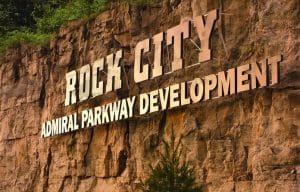Columbia discusses gambling
Video gaming and raffle licenses topped the list of agenda items during a Columbia City Council Committee of the Whole meeting Monday night.
As video gaming gains popularity in Illinois, the council is looking at its current liquor code to determine if any changes need to be made.
“The law doesn’t allow us to license and regulate the gaming. It allows us to license and regulate the liquor,” city administrator Jimmy Morani explained.
On the heels of the opening of a new video gaming establishment known as Ace’s Wild, and after discussions with the city’s aldermen, Morani, along with city attorneys Terry Bruckert and Doug Gruenke, made several proposed revisions to Columbia’s current liquor code.
“The only way establishments can get video gaming licenses from the state is if they have an on-premise liquor license,” Morani said of the state Video Gaming Act.
Among the proposed changes to the current liquor code is the distinction that a pourable liquor license would not be issued to any establishment that derives more than 50 percent of their revenue from video gaming.
“The intent is to not eliminate the restaurants and bars that have them, nor prohibit the way they’re currently being used in a majority of establishments in the city. The sense is the gaming parlors and video gaming rooms at gas stations are just not what I think the city envisioned when the state passed this law,” Morani said.
Although the city receives a portion of proceeds from video gaming terminals, the financial benefit to communities with video gaming parlors has yet to be determined, Morani said.
“I don’t know how much additional revenue would be coming to the city,” he said. “I think it would be taken from other sources. There could be a net increase in revenue but it would probably be marginal.”
The state law also allows for video gaming rooms in gas stations that sell liquor. Per the proposed changes to the city’s liquor code, no establishment could hold multiple liquor licenses. Gas stations that sell liquor have licenses to sell liquor to be consumed off premises. The on-premise license required to put in video gaming terminals couldn’t be issued in addition.
Morani emphasized the proposed changes would not put any restrictions on the current bars and restaurants with video gaming terminals.
“The city is just looking at a way to curb or discourage gaming parlors and video gaming in gas stations,” Morani said.
The committee of the whole also discussed raffle licensing, in light of the popularity of area Queen of Hearts raffles.
“There is conflicting information out there whether if we don’t issue the license it’s a valid raffle,” Morani said. “We thought we’d err on the side of caution and protect these entities that are holding the raffles.”
The proposed changes would make it easier to obtain raffle licenses. Among the changes are licenses that are good for one year for each raffle and increasing the maximum raffle pot from $500,000 to $1 million.
“In Aviston, (the Queen of Hearts pot) was up to $1 million. But some communities are saying they don’t want them to go that long and that high because they don’t want to deal with the headaches,” Morani said.
If a raffle would reach $1 million without a winner, the pot would be restricted to a $1 million payout and the overage would roll over into the next raffle.
Any proposed changes to existing city code on these matters must still be voted on by the entire city council.
In other Columbia news:
The city council voted to extend an electricity aggregation contract with Homefield Energy. By doing this, customers will see their rates remain steady – and even fall slightly. The current rate is $0.05950 and the new rate, effective Feb. 1, 2018, will be $0.05700, a decrease of 4.2 percent over current rates and 14 percent lower than Ameren’s winter rates.
At its Dec. 4 meeting, the council approved the hiring of two part-time paramedics, John Fischer and Jessica Zarlingo; two part-time emergency medical technicians, Adam Krump and Josue Murillo; and one full-time paramedic, Justin Lauf.
The council also approved a proposal for Quadrant Design to provide architectural services for City Hall renovations at a cost of $9,675.
The primary area of concentration for renovations is the first floor meeting room, which was formerly occupied by the Columbia Senior Center, and one office. The space will be modified to create four additional offices and a small break room.






